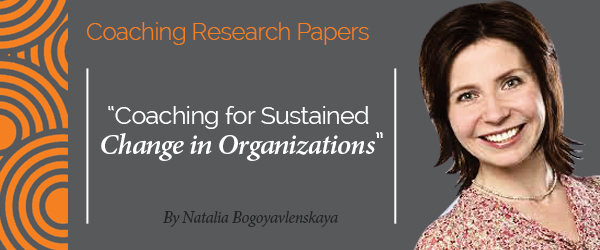A Research Paper created by Natalia Bogoyavlenskaya
(Executive, Business and Entrepreneurship Coaching, GERMANY)
It is not the strongest of the species that survives, nor the most intelligent that survives. It is the one that is the most adaptable to change.
Charles Darwin
What is the role of coaching in organisational transformation? What should the vector of its further development be to ensure sustained changes on organisational level? The article looks at 8-Step Process for Leading Organisational Change proposed by John Kotter comparing it with the more recent findings by McKinsey on what makes transformation successful. The results are analysed in the light of the current spectrum of coaching applications. It is argued that for sustained organisational change coaching should become more holistic going beyond predominantly executive and leadership coaching used today and be essentially more strategic.
Technological advances have been speeding up human life in all its manifestations throughout the entire history of humankind. However it’s only recently, at the dawn of the new Millennium, that the speed of technological development has reached such a level that it became literally impossible to even follow what’s been invented in the areas of our primer interests saying nothing about taking in use if only a minor portion of all the advances. We feel overwhelmed, stressed, unable to cope, feeling that we are lagging behind.
Ever increasing pace of change affected not only individuals but also the entire organisations, not just because organisations consist of people struggling with the speed of changes but because organisations themselves have a huge inertia resulting from their established infrastructures, stipulated processes and methodologies, integrated tools – all are way too heavy and so are difficult to promptly redirect or even to adjust to match the newly appearing requirements. Yet to stay competitive organisations need to be responsive both to the changing demands of the markets they are serving and all those new advances that could help leveraging their capacity, be they on the level of processes, tools or ways of working. As ‘lagging behind’ is life-threatening for businesses, organisations look for more efficient ways to master changes coming their way.
The change mastery has undoubtedly been a realm of Organisation Development (OD) and Change Management (CM). OD professionals, both internal and external to the organisation, have been helping businesses to go through the change and reach a new sustainable way of functioning, i.e. they’ve been helping to create a ‘sustainable change’. There would be a rigid analysis done, S.M.A.R.T.* goals set, strategies formulated, plans developed, business owners and change agents assigned, interventions designed and implemented and eventually the desired organisational change achieved… Well, with the reference to the increasing pace of change we discussed above, ‘sustainable changes’ start making little sense nowadays. Indeed, as the requirements for further changes come almost daily, maintaining the previously achieved status would mean disregarding those new requirements and gradually setting ourselves at losing in the market. That’s why more and more OD professionals are aiming now at creating a sustained change instead of sustainable changes we were seeking before.
May appear a minor vocabulary issue, but in contrast to sustainable organisational change, a sustained change means that organisation has become more perceptive to new and emerging requirements and developed capabilities to timely and efficiently respond to those. What it means is that to be successful in the future organisations need to set themselves on a continuous transformational journey, become more like a living organism than a rigid set of structures most of organisations are today. But how could this be achieved? What could help building increasingly more agility, more ‘liveness’ into organisational way of functioning? Taking into consideration the discussed earlier similarity between organisations and human beings in terms of the impact of the increasing speed of change, could we, for example, apply some of the solutions used by humans to the organisations?.
Thus, when individuals are setting themselves on a transformational journey they often do so with a support from a coach. Coach helps to create awareness, clarify needs and priorities, set goals, maintain continuous self-reflection and keep energy high while working towards those. As we discussed, in organisational context some of this support have been provided by OD, however, indeed only some. The reason is that from OD perspective an organisation is largely viewed as ‘a complex system of systems that exist within a larger system’ (Matt Minahan, cited by ODN), thus the very ‘living’ aspects of organisations and, correspondingly, its transformational capabilities are essentially left out of OD’s primer scope. So, could the pretty much structure-oriented OD approach be complemented by transformation oriented coaching? How much is there a space for coaching in OD work?______________________________________________________________________
*S.M.A.R.T. is a widely spread acronym standing for Specific, Measurable, Attainable, Relevant (sometimes read as Realistic) and Timely
